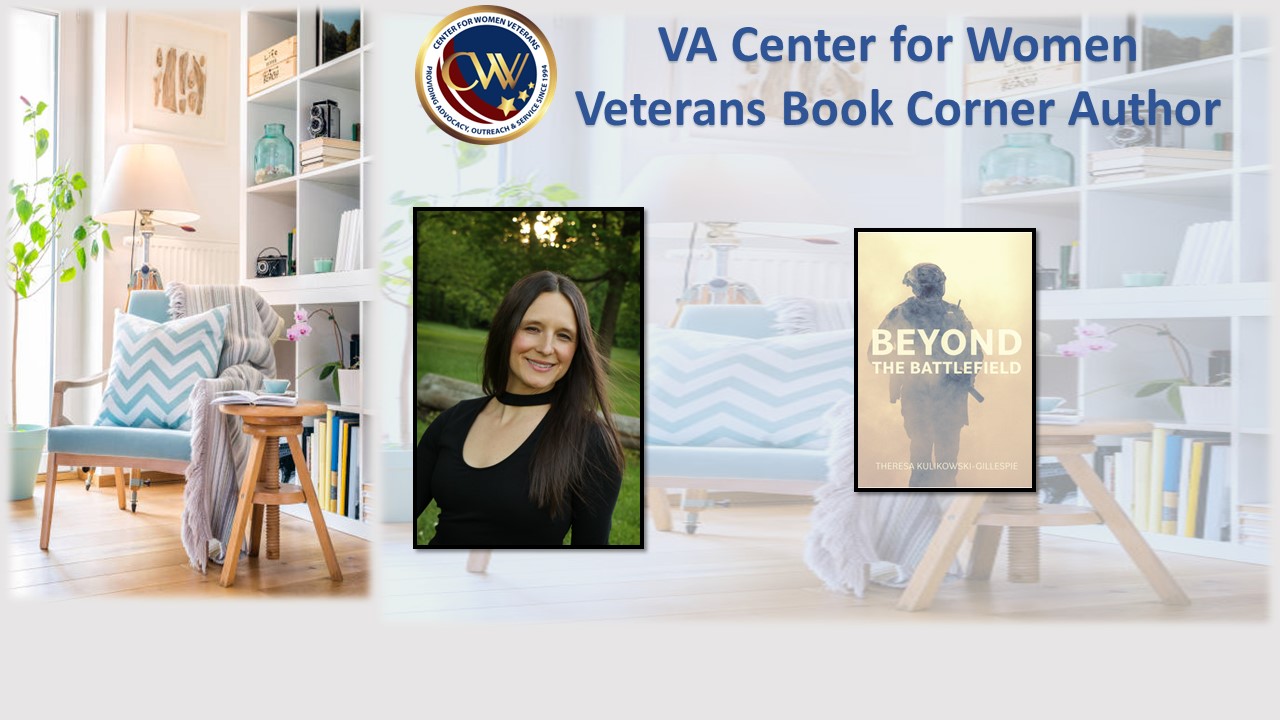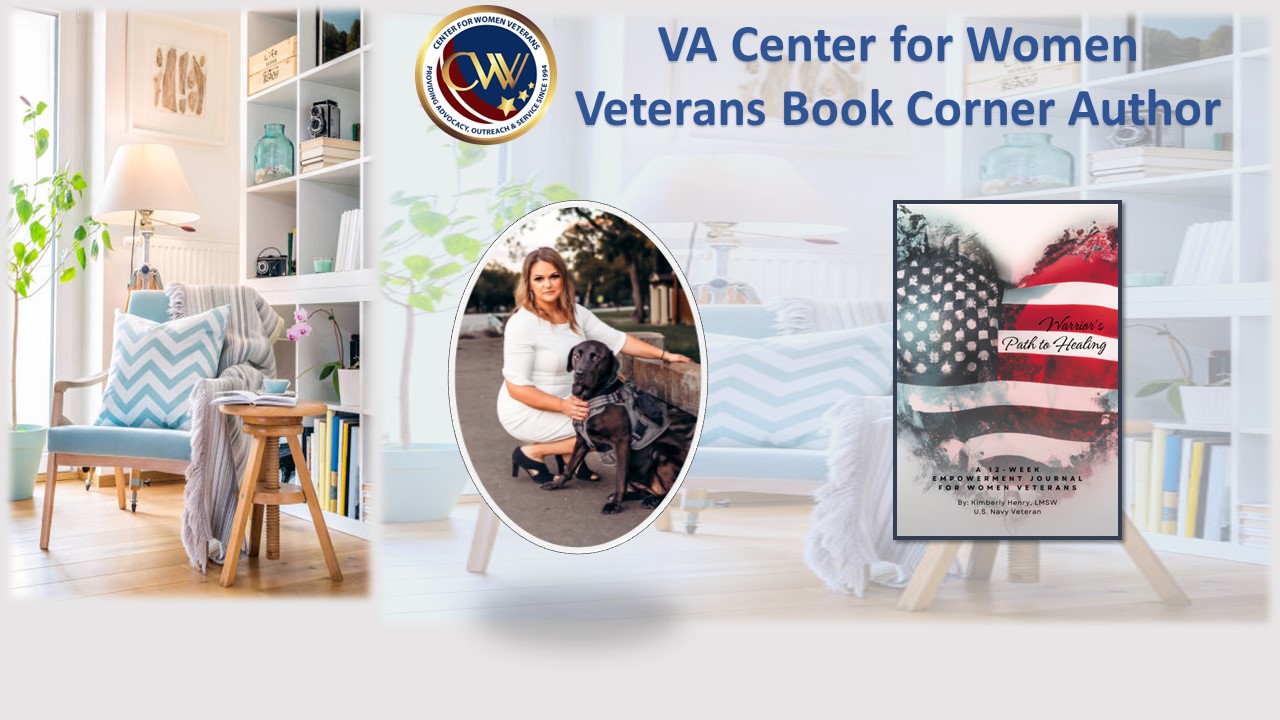This month’s Center for Women Veterans Book Corner author is Army Veteran Theresa Kulikowski-Gillespie, who served as a Physician Assistant (PA) from 2009-2012. She wrote “Beyond the Battlefield: Stories of Tenacity and Mindful Guidance Along the Warrior’s Path,” which shares the true stories of 15 military members, revealing their struggles and triumphs, the transformative role of mindfulness and meditation in their journeys towards healing and resilience. Kulikowski-Gillespie is a functional medicine PA, certified mindfulness meditation teacher, and former elite gymnast. Her health journey—sparked by a decline after her deployment to Tikrit, Iraq, led her to specialize in and write about holistic medicine.
Can you share a brief background of your military experience, including your branch of service, years served, and any notable positions or deployments?
I served in the Army from 2009-2012. I took a direct commission at the age of 29 as a physician assistant. I had worked two years as a civilian PA and felt called to join the Army as a medical provider. I deployed to Tikrit, Iraq, as the Battalion PA from October 2010 to August 2011.
What inspired you to write a book and share your story as a woman Veteran?
Sharing stories connects us as human beings. Military life can feel isolating at times, and it helps to know that, through others’ stories, we’re not alone in our challenges and triumphs.
Beyond the Battlefield evolved from an online course initially created for athletes transitioning out of gymnastics. After sharing the course with my former Battalion XO, he suggested many of the themes could relate to military service and the transitions within and out of military positions. One thing led to another, and I felt inspired to interview military service members, create a safe space for authentic sharing, and then tell their stories in the book. In addition to storytelling, I dive deeply into the benefits of mindfulness and meditation, and hwo it can be healing by building resilience around the challenges addressed in each unique story.
How has your military background influenced your writing style and the themes you explore in your work?
My time serving as a medical provider in the Army opened my eyes to the many issues facing those serving. The culture of toughness and “show no weakness” forces a façade of machismo externally, but I saw the inner struggles behind the closed and HIPAA-compliant doors of the clinic.
I wanted these struggles to be shared, heard and normalized. When we bring to light important issues, it’s a solid starting point for implementing positive change where needed.
My writing style is authentic. The individuals sharing their stories were authentic. I’m about sharing what’s true and, by living the truth, we can move closer to freedom, peace and true joy.
How do you hope your book will impact other women Veterans, active duty service members and the general public?
I hope people will know they aren’t alone by reading others who have experienced similar situations and emotions. I hope, for those unaffiliated with the military, that they develop more compassion for and understanding of military life and sacrifice. I hope everyone can learn more about mindfulness and the power of self-compassion and loving presence as ways of living that breed inner peace and balance.
What role do you think storytelling and literature play in fostering understanding and support for the women Veteran’s community?
They are essential. As I said before, stories connect us. We each have our own story. In some ways it’s our own and makes us unique as individuals. In other ways, it’s deeply connected with a shared common humanity.
Through storytelling, we open a portal for authentic connection rooted in compassion and understanding, both through the individual and unique lens, as well as the shared common humanity lens.
Can you share a memorable experience or anecdote from your time in the military that has had a lasting impact on your life and writing?
I was working in the clinic one day and received a call from a soldier who was really struggling. I told him he could come to the clinic and chat.
He opened up about the mental and physical health challenges he was facing, and he seemed interested in learning as many tools as possible to help him navigate his medical board and the many emotional and physical repercussions of his time in combat.
At that time, I was reading a lot about mindfulness and meditation, and I mentioned a book to him. It opened a discussion around the benefits of mindfulness and how it changes our brain anatomy and physiology.
He was so appreciative and eager to employ these practices moving forward. It was deeply fulfilling to connect this way and offer some tools and guidance supporting this soldier’s healing.
A few years later, we crossed paths. He was doing competitive weightlifting, feeling healthy and strong, and he shared his gratitude for my help years earlier. It was deeply touching and speaks to the importance of pausing and taking time to listen to and honor the suffering of others while also empowering them with tools and a sense of trust that they will find their way.
Are there any fellow women Veteran authors or books that have inspired or resonated with you? If so, could you tell us a bit about them?
“Facets of Love” by Melissa Renee. She is a retired Warrant Officer and wrote this memoir of her healing path through divorce and rediscovering herself within a more feminine framework. It was a beautiful, very heartfelt and sincere read, and one I recommend to any woman trying to rediscover herself outside of cultural norms.
How do you believe the Women Veterans Book Corner can help bring awareness to the civilian and military communities, particularly about women Veterans?
As we support and share each other’s stories, word of mouth and the power of community are far-reaching.
What advice do you have for other women Veterans or active-duty service members who may be considering writing about their experiences?
I encourage them to do it! Reflect on what feels true to you and how you want to share your experiences, and then do it. Don’t try to be perfect at it. Just be yourself and let authenticity guide your writing and expression.
How has writing this book helped you?
It was deeply meaningful to listen to others’ stories. I had known some of the people in my book for several years. It was quite sacred to offer them a space to open up honestly about experiences and feelings I had never known them to have. It has allowed me to see I’m capable of writing a book and that I can trust the process. I found that there was time and energy for each stage of the publication process. I conducted the interviews and then didn’t feel motivated to write for over a year. Once I revisited one interview, I felt this energy to write the book. It felt like an organic process that I could trust. It also helped me share some of my deeper struggles and establish an outlet through writing that is rooted in honesty and wise hope.
Can you tell us about any upcoming projects or events you’re involved in that our audience might be interested in?
I’m writing my second book, “Beyond the Chalk Box,” which uses a similar format of candid interviews, but this time, it’s with Olympic gymnasts. In addition to mindfulness and meditation, I explore deeper issues within high-level athletics and encourage additional tools and practices, such as spirituality, mantra, breathwork and other introspective practices.
I’m also the founder of Fit Intuit, which offers holistic wellness and performance coaching for high-achievers such as military populations and high-level athletes.
Are you a woman Veteran author, or do you know of one?
If so, please visit our website to find out more information. If you have further questions, contact the CWV Outreach Program Manager Michelle Terry at 00W@VA.Gov.
Topics in this story
More Stories
This month's Center for Women Veterans Book Corner author is Navy Veteran Kimberly Henry, who served as a Cryptologic Technician and Sexual Assault Victim Advocate from 2009-2019. She created "Warrior's Path to Healing: A 12-Week Empowerment Journal for Women Veterans."
Thinking about building a family or exploring fertility treatments? VA can support you with a wide range of services.
Report examines the input of over 7,000 women Veterans: They are happier with VA health care than ever before.






